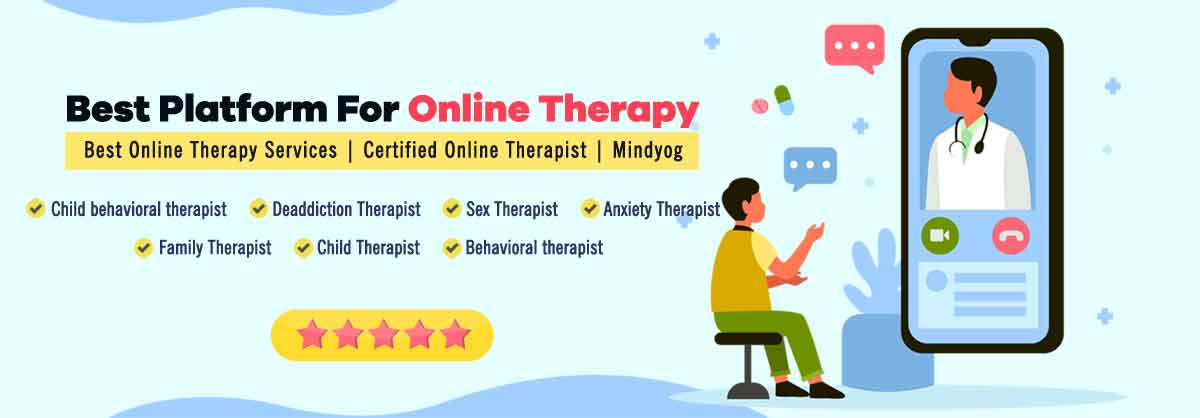
Nikita Singh
![]()
I interned at MindYog for a month Under Arpita ma’am, and it was an enriching experience, she patiently took all my queries, and helped with deeper understanding of therapies in practice. Grateful for the experience!
Rishabh Bhutani
![]()
Mind Yog truly deserves five star rating. I had become victim of panic disorder due to anxiety. But my condition has improved. All thanks to mind yog who really care about patients.
Puja Mishra
![]()
I have done 1 month online internship programme at the Mind Yog. It was an amazing learning experience. As well as very good services
Rachel Grace
![]()
Hello. I had a very good learning experience from Mindyog and Their team. All the staffs are well trained. My mentor was especially very knowledgeable
Read MoreThe classic definition of psychotherapy by Woolberg is psychotherapy is the treatment, by psychological means, of problems of an emotional nature in which a trained person deliberately establishes a professional relationship with the patient with the object a) of removing, modifying or retarding existing symptoms b) of mediating disturbed patterns of behaviour and c) of promoting positive personality growth and development.
Hence, psychotherapy is the evidence based treatment method which is used to help people deal with various mental illness and emotional problems. Both children and adults can be benefitted by it. It can be conducted one to one with an individual or in a group, in couple or family settings. Confidentiality is the key to any form of psychotherapy. The patient and psychotherapist collaborates together and with a joint effort help the patient eliminate or control troubling symptoms and function better in their day to day life. Evidences are that patient who takes a combination of medication and psychotherapy have better recovery than patients who depends only on medications or psychotherapy. With the use of brain imaging techniques researchers have been able to see changes in the brain after a person has undergone psychotherapy. The therapist explains to the patient why he has particular symptoms, so that the patient gets complete insight about the illness or situation.
Therapy does not take dependent people and make them independent of needing others but helps them manage their dependent needs according to their best interests. Progress in psychotherapy involves on-going efforts at identifying patient’s own feelings, attitudes and motivations. It encourages him to experience and verbalize who he is, what he believe and what he wants.
Psychotherapy helps the patient recognise and handle feelings/emotions and develop ego strength. There are several types of therapies each planned to deal with specific symptoms and complaints. Here are a List of therapies commonly practiced:
CBT is based on cognitive models of disorders and cognitive and social learning principles. Therapists help clients to change the thoughts assumed to precede problematic emotions and behaviours. more..
Classical Behaviour Therapy is based on learning theory and behavioural principles, and is focussed on directly changing problematic emotions and behaviours through counter-conditioning negative emotions, or reinforcement of more appropriate behaviours. more..
ACT aims to help the people clarify their personal values and take action on them, bringing more vitality and meaning to life and increasing psychological flexibility. more..
Mindfulness is a state of non-judgmental awareness of what’s happening in the present moment, including the awareness of one’s own thoughts, feelings, and senses. Over the past decade, mindfulness has worked its way into the world of mental health because of its many benefits to cognition and mental wellbeing. more..
stress has become an unavoidable thing and a concrete part of our day to day life. This technique will help patients learn about their own stressors, symptoms, and strategies to overcome stress, by using social support, emotional management, life balance, and meeting one's basic needs. more..
DBT Dialectical Behavioural Therapy is a evidence based psychotherapy which was first used to treat borderline personality disorder. DBT is a therapy designed to help people change patterns of behaviour that are not helpful, such as self-harm, suicidal ideation, and substance abuse. more..
MBCT includes simple meditation techniques to help participants become more aware of their experience in the present moment, by tuning into moment-to-moment changes in the mind and the body. Patient learn the practice of mindfulness meditation through a course of eight to ten weekly classes. It encourages clients to change their relationship to their own thoughts, feelings and body sensations, so that they have an opportunity to discover that these are fleeting events in the mind and the body which they can choose to engage with – or not. more..
MCT based on the principle that worry and rumination are universal processes leading to emotional disorder. It usually deals with repetitive thinking patterns that often lead to prolonged psychological distress like worry and rumination. more..
ST is used for the treatment for personality disorders and painful. Grief resolved itself on its own but in some cases the grief lasts longer and other chronic mental conditions. more..
grief is a natural normal process, which is very personal and painful. Grief normally gets resolved with time but it some cases it becomes more complicated with time. Grief therapy helps the person come to terms with a significant loss, and to accept the new realities of their life. more..
as the name suggest this particular therapy helps the patient to get self-motivated towards quitting any type of addiction. It helps the individual to resolve their own ambivalence and evoke rapid internally motivated change. more..
hypnosis with the help of focused attention and increased suggestibility helps patients to deal with variety of concerns and issues. Hypnosis is very effective in pain management, dealing with anxiety, phobia, neurotic disorders, addictions, dissociative disorder. Positive suggestions and guided imagery is used as its techniques. more..
family therapy is designed for families, couple, and people in intimate relationships who care for each other so that they can explore and communicate negative or difficult thoughts and emotions with each other openly and safely, so that a better understanding is developed between them. Therapy helps them understand each other’s need, appreciate each other’s presence, strengthen their relationship and make useful changes. more..
this therapy helps in the improvement of sexual functions and treats sexual dysfunctions. See therapy is very effective when the patient is suffering from premature ejaculation or delayed ejaculation, lack of arousal or sexual desire, painful sexual experience etc. more..
Gottman method. There’s no relation in the world that is perfect, there’s no one without conflict, whether its parent child relation, husband and wife relation or siblings relation. We must learn to manage our conflicts instead of trying to avoid or resolve the conflicts. The Gottman method is the most effective technique when it comes to couple therapy as it has 3 decades of research and thousands of couple benefiting from it. The Gottman Method uses couples counselling techniques to increase affection, closeness, and respect. Understanding why some couples sustained their marriages, while others did not. Through the techniques you can learn how to manage your conflicts, have an open conversation calmly. more..
this therapy is designed to alleviate the distress which is associated with painful and traumatic past experience or memory. This therapy is very effective for patients dealing with post-traumatic stress disorder. more..
this therapy helps the patient to attain state of deep calmness and peace. This technique helps the patient reduce anxiety levels, pain, anger and stress. There are multiple techniques falling in this category, where different techniques are used to deal with insomnia, panic attacks, phobia, PTSD, pain, addiction, nightmares etc. more..
anger is a normal healthy emotion if channelized in the positive direction. Anger management therapy helps the client to understand their anger in a better way, getting more aware about the signs of anger, taking proper actions to calm oneself, expressing anger in more appropriate way and deal with the situation in a positive way. more..
this therapy is used as the first line of treatment with the petiole suffering from obsessive compulsive disorder. The therapy helps the patient to face the anxiety and fear instead of the regular practise of neutralising it through compulsions. A combination of CBT and ERP is used to deal with both obsessions and compulsions. more..
this kind of therapy is specially designed for children enabling the child to express their emotions and experiences or fears through toys, paintings, dance etc. This kind of therapy helps the child to become more socially integrated further enhancing their development and growth. It also helps the therapist to understand child’s disturbed behaviour. more..



